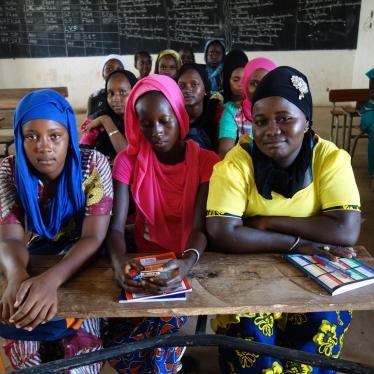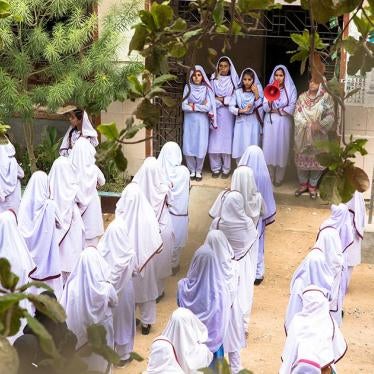This memorandum, submitted to the United Nations Committee Against Torture (CAT) ahead of its upcoming review of Rwanda, highlights areas of concern Human Rights Watch hopes will inform the CAT’s consideration of the compliance of the government of Rwanda (“the government”) with the Convention against Torture and Other Cruel, Inhuman or Degrading Treatment or Punishment (Convention against Torture). It contains information on persistent violations by Rwandan authorities and those empowered by them that violate the government’s obligations under the Convention against Torture, and it proposes specific recommendations that we hope to see the CAT formulate for the Rwandan government. Human Rights Watch looks to the CAT’s upcoming review to address these problems in depth.
We consider this review to be a key opportunity to bring the international attention and engagement we believe are crucial to ensure that detainees are protected from torture, ill-treatment and unlawful detention and those responsible for abuses are held to account.
Acts of torture in Rwanda (Articles 2 and 11)
Human Rights Watch has closely monitored human rights in Rwanda for over 20 years. Torture and ill-treatment have been persistent problems in Rwanda and have been perpetrated with near impunity.
Between 2010 and 2016, scores of people suspected of collaborating with “enemies” of the Rwandan government were detained unlawfully and tortured in military detention centers by Rwandan army soldiers and intelligence officers. Some of these people were held in unknown locations, including incommunicado, for prolonged periods and in inhuman conditions. Human Rights Watch issued a report on this in October 2017.[1]
Torture and illegal detention are designed to extract information from real or suspected members or sympathizers of the Democratic Forces for the Liberation of Rwanda (FDLR)—a largely Rwandan Hutu armed group based in eastern Democratic Republic of Congo, some of whose members participated in the genocide in Rwanda in 1994—and, to a lesser extent, the Rwanda National Congress (RNC), an opposition group in exile, and the Forces démocratiques unifiées (FDU)-Inkingi, a banned opposition party.
In the cases documented by Human Rights Watch since 2010, most detainees were held near the capital, Kigali, or in northwestern Rwanda. Many were held at multiple locations during their detention, including at the premises of the Ministry of Defence (known as MINADEF), at Kami military camp, at Mukamira military camp, at a military base known as the “Gendarmerie,” at detention centers in Bigogwe, Mudende, and Tumba, and at private homes used as detention centers. Human Rights Watch is not aware of any Rwandan laws or statutes allowing for the military or other authorities to detain people at these locations.
Severe beatings, electric shocks, asphyxiation and mock executions were used to force suspects to confess, or to incriminate others. Former detainees were held for up to nine months in extremely harsh and inhuman conditions, with insufficient food and water to meet their basic needs. Human Rights Watch received allegations that some detainees were killed, but we were unable to verify these reports.
In many cases, after several months of illegal detention—and often only after detainees had signed a statement under torture—the Rwandan authorities transferred them to official detention centers, including civilian prisons, and they were then charged and put on trial. The period of their detention in military centers was erased from the public record.
Use of confessions where allegations were obtained through torture (Article 15)
In many cases, defendants who had been unlawfully detained and tortured did not receive a fair trial. Many were sentenced to lengthy prison terms, including life imprisonment, sometimes partly or entirely based on confessions or witness testimonies obtained under torture. Many are still in prison. Others were acquitted and released after lengthy pretrial detention.
Impunity of perpetrators of torture (Articles 12 and 13)
Despite being told not to reveal the abuses they faced in detention, many of the defendants told judges they had been illegally detained or tortured in military detention centers. Human Rights Watch is not aware of any judges ordering an investigation into such allegations.
Military and intelligence officials responsible for torture benefit from the general climate of impunity. Human Rights Watch is not aware of any disciplinary or judicial action against military or intelligence officials for illegal detention or torture in military centers.
Acts of cruel, inhuman and degrading treatment in Rwanda (Article 16)
For at least the last twelve years, Rwandan authorities rounded up poor people and arbitrarily detained them in so-called “transit centers” (also called “rehabilitation centers”) across the country. The conditions in these centers were harsh and inhuman.
Homeless people, street vendors, street children, sex workers and other poor people, were taken off the streets and detained in these centers for prolonged periods. Detainees had inadequate food, water, and health care; suffer frequent beatings; and rarely leave their filthy, overcrowded rooms. None of them were formally charged with any criminal offense nor saw a prosecutor, judge, or lawyer before or during their detention. Human Rights Watch remains concerned about this lack of due process and consider these detentions unlawful.
While these centers are officially meant to “rehabilitate” people through professional training or education, most of the people Human Rights Watch interviewed did not receive such training and were treated as prisoners.
There are at least 28 of these centers across Rwanda; however, since 2015, Human Rights Watch research focused on four locations: Gikondo (Kigali), Muhanga (Muhanga district), Mbazi (Huye district), and Mudende (Rubavu district).
Conditions at the different locations are similar. Police or other groups responsible for security rounded up the detainees and transported them to the centers. Most detainees were not allowed to leave their room, except to go to the toilet only twice a day. In most cases, food was no more than one cup of corn a day, and several former detainees complained about the lack of drinking water or the opportunity to wash.
Beatings were commonplace. In Gikondo and Muhanga, many interviewed said they were beaten by police or by other detainees, often with sticks. In Mudende the beatings were daily. Two adults detained in the center in Mbazi told Human Rights Watch in 2016 that they were beaten as soon as they arrived.
Human Rights Watch received information about several people who died during or just after their detention in Mudende, allegedly as a result of injuries from beatings, poor conditions, and lack of medical care. Human Rights Watch shared information about one such case with the Justice Ministry in 2016, which expressed willingness to thoroughly investigate the allegations. Human Rights Watch is not aware that any investigation was launched.
Children as young as 10 were detained in these centers, as well as infants who accompanied their detained mothers.
The existence of these centers reflects a government perception of certain groups of people as offenders or sources of nuisance, rather than victims or vulnerable people.
One month after Human Rights Watch published a report on the Gikondo transit center in 2015[2], the Kigali City Council adopted a new directive on the Kigali Rehabilitation Transit Center – the official name for the Gikondo transit center – laying out the center’s objectives and procedures. The directive addresses the lack of a legal framework for the center. It also lists the rights of those taken to the center, including the rights not to be subjected to corporal punishment, harassed, or discriminated against; access to hygiene and health care; and the right to visits.
However, rather than eliminating arbitrary detention, the directive seems to embed detention practices that could conflict with Rwanda’s obligations under international human rights law. Under the directive, the center is to receive people whose behavior disturbs public order and security – a broad and vague notion that could be applied to categories of people for whom arrest and detention are not an appropriate or lawful response. The directive also states that most detainees should leave after a maximum of 17 days, but it leaves open the possibility that some could be held indefinitely if they do not pass a “test.”
Furthermore, conditions inside Gikondo have not fundamentally changed since the directive was adopted. There has been some progress in terms of health and hygiene, and it appears that women are not beaten as regularly as before, but research conducted as recently as September 2017 suggests that conditions remain very poor and people are still arbitrarily detained.
The Subcommittee on Prevention of Torture
In October, the Subcommittee on Prevention of Torture and other Cruel, Inhuman or Degrading Treatment or Punishment (SPT), a monitoring body of the Optional Protocol to the Convention against Torture, (ratified by Rwanda in 2015), conducted a state visit to Rwanda. They had to suspend their visit and leave sooner than planned, however, citing obstruction from the Rwandan government and fear of reprisals against interviewees. This was only the third time in ten years that the SPT has suspended a visit.[3]
A press release issued by the government after the SPT suspended its trip listed sites the SPT had visited, which included Kami and Gikondo.[4]
National Legal Standards
Rwanda’s constitution states that “no one shall be subjected to torture or physical abuse, or cruel, inhuman or degrading treatment.”[5] Torture is a crime under Rwanda’s 2012 penal code, which uses a definition largely inspired by the wording of the Convention against Torture. Torture is punishable with up to two years in prison, increased to seven when there are permanent consequences, or life imprisonment when torture results in the death of a victim. Maximum sentences are applied when the offender is a security service officer or a civil servant.[6]
Recommendations
Human Rights Watch encourages the CAT to use the upcoming review to ask the Rwandan government to:
- Immediately cease arbitrary and unlawful detention and torture in military detention centers;
- Commission an independent investigation into allegations of torture, enforced disappearances, unlawful and arbitrary detention and arrests, even without an official complaint by victims or their families, and ensure that the perpetrators are brought to justice;
- Explain what steps it has already taken to investigate credible and well-documented allegations of torture and ill-treatment by military intelligence officials, the status of investigations, if any, and the findings;
- Invite the UN Special Rapporteur on Torture to conduct a fact-finding mission to examine the use of torture in military detention facilities;
- Immediately close “transit centers” and ensure that anyone deprived of their liberty in these centers is detained only on grounds explicitly provided for in law and in accordance with full respect for due process rights;
- Investigate cases of abuse and misconduct by the police at “transit centers” and prosecute officials responsible for the illegal detention and ill-treatment of detainees at these locations.
[1] “‘We Will Force You to Confess’: Torture and Unlawful Military Detention in Rwanda,” Human Rights Watch report, October 10, 2017, https://www.hrw.org/report/2017/10/10/we-will-force-you-confess/torture-and-unlawful-military-detention-rwanda.
[2] “‘Why Not Call This Place a Prison?’: Unlawful Detention and Ill Treatment in Rwanda’s Gikondo Transit Center,” Human Rights Watch report, September 24, 2015, https://www.hrw.org/report/2015/09/24/why-not-call-place-prison/unlawful-detention-and-ill-treatment-rwandas-gikondo.
[3] United Nations Subcommittee on Prevention of Torture, “Prevention of Torture: UN human rights body suspends Rwanda visit citing obstructions,” news release, http://www.ohchr.org/EN/NewsEvents/Pages/DisplayNews.aspx?NewsID=22273&LangID=E (accessed November 3, 2017).
[4] Ministry of Justice of the Republic of Rwanda, “Statement on Subcommittee on Prevention of Torture Mission Termination”, http://www.minijust.gov.rw/media/news/news-details/?tx_ttnews%5Btt_news%5D=690&cHash=b0b50f1b9a26af4c5408c78abb186729 (accessed November 3, 2017).
[5] Constitution of the Republic of Rwanda of 2003, revised in 2015, art. 14.
[6] Organic Law instituting the penal code, No. 01/2012/OL of 02/05/2012, arts. 176 and 177.








